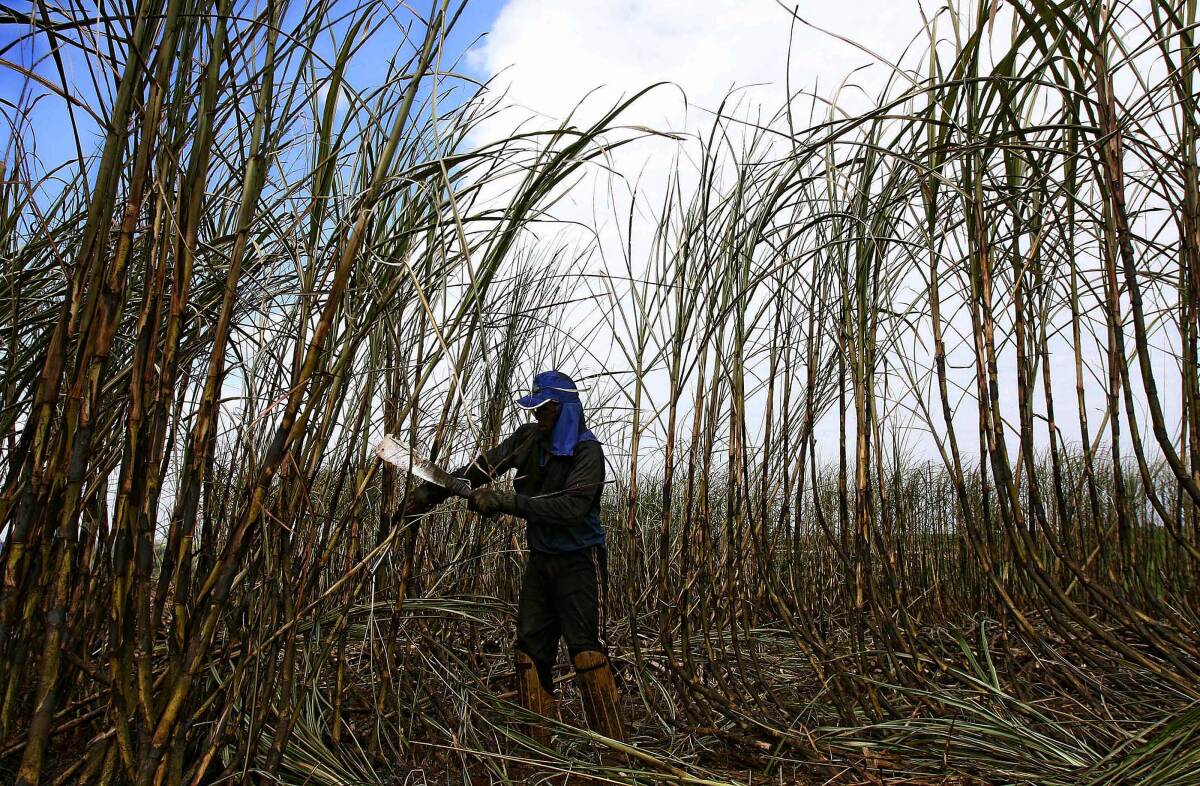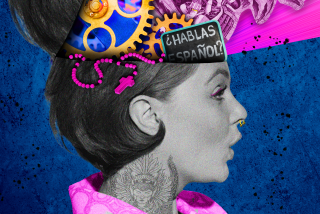Op-Ed: The story of sugar: Black suffering, white windfall

- Share via
In an age when abundance is often taken for granted, some products have become so plentiful that they can scarcely be avoided, and perhaps none more so than sugar.
It is the scourge of both the prosperous and the poor. The former spend billions to work off its effects, by paying extra to eat foods with no sweeteners added and through expensive fitness habits. The poor, meanwhile, often live in so-called food deserts where they are harmed by sugars that saturate processed foods, even ones that don’t taste sweet.
Sugar’s omnipresence has become a major public health menace, driving up rates of diabetes to levels never seen before and contributing to obesity, heart disease and other maladies along the way.
All of this makes it hard to imagine a time when sugar was an exorbitant rarity, but only in doing so can we understand the West’s road to modernity and the tragic links to slavery.
Before the early 17th century, refined sugar was first known as an exotic spice and medicinal. In Europe, it was so expensive that its consumption was mostly limited to royalty and their courts. This began to change suddenly, though, with the ramping up of production of sugar cane, especially in Portuguese Brazil and then in English-controlled Barbados in the 1580s and 1630, respectively.
With fateful effects, both of these European colonies used a model that had been perfected in the 1530s on a previously uninhabited island off the coast of Central Africa called Sao Tome. There, Portuguese who had recently experimented with producing sugar from cane much farther north in the Atlantic, at Madeira, found the perfect tropical environment for the crop.
I traveled to Sao Tome as I traced the history of transatlantic slavery. The equatorial island was blessed not only with a warm climate year-round but also with rich, volcanic soils and plentiful rainfall. The only thing that was missing was the labor needed to plant and harvest the crop, which a Portuguese writer called “the most onerous activity that has been discovered on earth.” Lisbon found this labor in nearby Africa, jump-starting 250 years of mass trade by Europeans in enslaved people from that continent.
The techniques put in place at Sao Tome — subjecting Africans to chattel slavery on large plantations using a set of highly synchronized activities that produced loaves of sugar in unprecedented quantities — quickly leaped across the Atlantic, and with them, the slave trade.
Profiting from conflict in Brazil between the Portuguese and Dutch, the English copied these methods in Barbados, which is not much more than twice the size of California’s Santa Catalina Island. From 1627 to 1807, nearly 400,000 enslaved Africans would be put to work there, making it as big a market as the English colonies that became the United States. Despite Barbados’ modest acreage, after scarcely more than three decades of production, by the middle of the 17th century the island was already earning more in profits for London in sugar than mighty Spain was gaining from its fabled trade in New World silver. Brazil, which imported 4.5 million Africans, more than any other destination, likewise earned far more for Portugal in sugar than from its prodigious gold boom.
The windfall in wealth that derived from enslaved labor helped power England’s economic rise in the 17th century, with the nexus between the slave trade and sugar production fueling the growth of a host of businesses, including shipbuilding, metalworks, banking and insurance, cloth, guns, rum and English sugar refineries, not to mention the lucrative trade in human beings.
For more than a century, standard Western narratives played down slavery’s role in the rise of Britain and in much of Atlantic-facing Europe, favoring cultural explanations for that continent’s divergence in wealth and power from other civilizations. Just as the U.S. has in recent decades increasingly come to recognize the role of slavery in its history and its social ills, so must Europe now turn to the even more neglected impact of sugar and African slavery, and the wealth they created, on European culture itself.
::
The explosion of slave-produced commodities, led by sugar, coffee and tobacco, utterly transformed European society, setting the continent, led by Britain, on its path of ascendancy in ways that rival in importance their big economic dividends from slavery.
For lack of clean water, the English once commonly drank ale during the workday, producing lethargy or worse. As these New World plantation crops boomed, though, sugar became cheap, and that made coffee, rendered sanitary by boiling, drinkable. Ale began to fade as a daytime staple, boosting productivity, and an entirely new business model was born, with profound effects: the coffee shop.
After the first of these opened in Oxford in 1650, they spread with startling speed, and once they were established in London, they gave birth to yet another decisive cultural innovation: the newspaper. Clever publishers began selling these printed sheets to a kind of captive customer base: coffee drinkers stimulated by caffeine (and often tobacco) who lingered in cafes.
There, something else transformational occurred. For the first time, people not only began to publicly discuss the news of the day based on regularly updated written accounts; they also began to take these public conversations, and the right to express an informed opinion about the political events of the day, as a central feature of citizenship. This is the very birth of the public sphere, as it was called by the German philosopher Jürgen Habermas. Coffee culture, as much as any constitutional text, created the underlying fabric of democracy.
::
For all of our present concerns with diet and health, sugar was a scourge of an altogether different order for the African continent. More than any other crop, with its brutal regimens, the production of sugar ground out the lives of enslaved people brought to the New World to labor on plantations, literally working people to death.
By the same token, it helped drain Africa of untold millions of its people, mostly in their prime, and fueled conflict and political disarray, whose powerful aftereffects still permeate life on that continent. And in the West, until recently Eurocentric cultures have told themselves almost nothing but self-satisfying stories about the sources of their success, overlooking their foundations in Black toil and suffering.
Howard W. French, a professor of journalism at Columbia University, is the author most recently of “Born in Blackness: Africa, Africans, and the Making of the Modern World, 1471 to the Second World War.”
More to Read
A cure for the common opinion
Get thought-provoking perspectives with our weekly newsletter.
You may occasionally receive promotional content from the Los Angeles Times.










